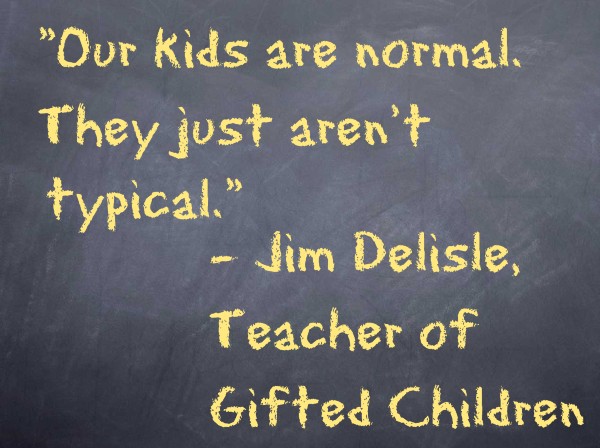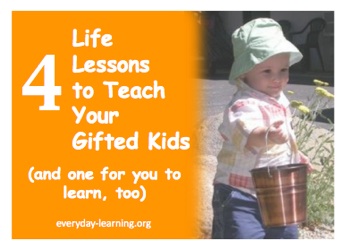(and Improve Education for All Kids in the Process)
by Kathleen Casper
This article is from SENG. Gilbert Supporters of the Gifted is making this article into a five part series. Part five is below...

Encourage gifted children to be advocates
Gifted children have so much intellect that many politicians could only dream of having, that they can focus on changing the world if they only knew how to use their intellect to effectuate change.
This is not a dig on politicians, because there are many brilliant politicians out there. But many gifted adults shy away from getting involved in politics for multiple reasons- some of them are naturally introverts who do not enjoy being in the limelight; some of them have other interests and never really cared much about politics in general; and some of them (I would argue, many of them,) never got involved in politics at young ages so they grew up believing politics and politicians were just not accessible or that politics in general did not make sense because civics was not stressed in school and their families weren’t involved so they never got involved either.
“Getting involved” in politics may not have been explained well to this latter lot of individuals- perhaps they believed that to be involved you had to run for office, or work at the Capitol, or donate tons of money. Maybe they felt that politicians did not do things the way they should do things, so they wrote politics off as being a negative thing. But if gifted children are taught early that getting involved is a positive thing… that their voices mean something… that they can bring change in multiple ways and influence others with their knowledge… then perhaps gifted children can grow up to be strong advocates for education and other things that influence the lives of gifted children and adults, and eventually our world would shift in a more supportive direction for the goals of gifted advocacy in general.
So how do we encourage this? By helping all students realize their worth in their communities- connecting them to organizations, local leaders of all types, and providing them with knowledge of the processes and the interactions that bring forth decisions that impact everyone on a day to day basis.
We need to teach them civic, economics, and history of the world the United States. We need to teach effective communication by helping our children build strong vocabularies and make effective word choices. We need to teach them to engage in debate supported by speech-writing and presentation skills and effective letter composition. Reading comprehension is crucial not only to understanding innuendo and literal expression, but to formulating effective and reasoned responses.
We ought to teach them to look at governmental decisions across history and evaluate them based on their own moral codes and society’s ethics and the goals of their regions and their neighborhoods and the country as a whole.
We can connect them with leaders who will welcome their voices in discussions by bringing in speakers to talk with classes of children and bring lessons to them from real life, to discuss current events that impact their own lives and interest them- to help them craft letters to ask politicians to change things to help their families or improve their playgrounds or their families’ transportation options.
We need to bring them to the places where decisions happen, both in the bigger governmental picture; i.e., courtrooms and legislative chambers and city council meetings and parks district meetings, as well as in the smaller, more detailed picture; i.e., nonprofit board meetings, neighborhood council events, meetings with school administrators and PTAs, and other groups of people who care.
We have to show children how to contribute and get involved in issues they care about so that they feel like they have an impact as youngsters. By doing this, they can put their gifted intensities to work on things that help others and make things better for themselves and those they care about. When they have questions or doubts, we need to show them where to go to learn more and adjust their sails and move forward even through hardships. Because struggling for something that is bigger than just a classroom assignment is often much more worthwhile and larger life lessons come out of those moments than anything teachers can create in a text book.
Once we teach them how to harness their knowledge from history and the skills they need to interact effectively with others in society, they are like arrows going forward into society, finely tuned to create change and create other leaders along their path by infecting them with their excitement and passion for their causes.
Imagine how much more effective we could be as education advocates if our children knew even more than we did about the topics we are interested in fixing, how much more powerful the masses would be if they understood how their actions can be used to effectuate change for the better. Think about how many negative gifted traits such as anxiety, depression, loneliness, hopelessness, etc. can be turned around by teaching children how they can use their talents and natural desires to make a difference, to be heard by people they otherwise may never believe would listen to them, and to help them actually give back in ways that can change things for so many others.
This is a work in progress. Some teachers are already pushing forward in these areas. There are multiple places you can go to get information about educating children, parents, community members, advocates and others on gifted education needs and gifted characteristics. Start with reaching out to your local schools and ask them about the resources they have. If they don’t have resources or only have limited resources, send them more information as you find it and become a team in your search to improve access to resources for their staff. Look online for local advocacy groups and parent support groups. Check the SENG and NAGC resource lists and libraries. Look at websites like Hoagies that list multiple sources. Get involved with parent organizations like gifted home school groups and parenting gifted children groups that have blogs and Facebook pages and keep up on local research and education opportunities by attending state and national gifted education conferences- parents are often welcome and appreciated at those events.
As individuals we are only as strong as our arms can reach and our voices can be heard, but by reaching out to others who share our concerns for education in general, we are much stronger. Use the networks you have and create new ones as you go and together perhaps we can see education change to better serve all children by leading with our example of asking the schools to differentiate, to understand every child better, and to help every child learn, every day. Thank you for all that you do for these kids, and all that we will do for them as we continue down this path together.
We hope you enjoyed this 5-part series and found it insightful.





















